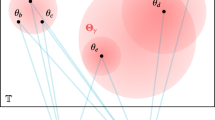Abstract
The topic of this paper is the question whether there is a logic which could be justly called the logic of inference. It may seem that at least since Prawitz, Dummett and others demonstrated the proof-theoretical prominency of intuitionistic logic, the forthcoming answer is that it is this logic that is the obvious choice for the accolade. Though there is little doubt that this choice is correct (provided that inference is construed as inherently single-conclusion and complying with the Gentzenian structural rules), I do not think that the usual justification of it is satisfactory. Therefore, I will first try to clarify what exactly is meant by the question, and then sketch a conceptual framework in which it can be reasonably handled. I will introduce the concept of ‘inferentially native’ logical operators (those which explicate inferential properties) and I will show that the axiomatization of these operators leads to the axiomatic system of intuitionistic logic. Finally, I will discuss what modifications of this answer enter the picture when more general notions of inference are considered.
Similar content being viewed by others
References
Avron A. (1991). ‘Simple consequence relations’. Information and Computation. 92:105–139
Belnap N. (1962). ‘Tonk, Plonk and Plink’, Analysis 22: 130–134
Brandom R. (1994). Making It Explicit. Harvard University Press, Cambridge (Mass.).
Brandom R. (2000). Articulating Reasons. Harvard University Press, Cambridge (Mass.).
Došen K. (1993). ‘A historical introduction to substructural logics’. In: Došen K., Schröder-Heister P. (Eds). Substructural Logics. Clarendon Press, Oxford.
Došen, K., ‘Logical constants as punctuation marks’, [9], 273–296.
Dummett M. (1991). The Logical Basis of Metaphysics. Duckworth, London.
Frege, G., Begriffsschrift, Nebert, Halle, 1879.
Gabbay D., eds. (1994) What is a Logical System?. Oxford University Press, Oxford
Gentzen G. (1934). ‘Untersuchungen über das logische Schliessen I-II’, Mathematische Zeitschrift 39: 176–210
Haack S. (1996). Deviant Logic, Fuzzy Logic. University of Chicago Press, Chicago .
Hacking I. (1979). ‘What is logic?’, Journal of Philosophy 76: 285–319
Hilbert D., Bernays P. (1939). Grundlagen der Mathematik. Springer, Berlin
Koslow A. (1992) A Structuralist Theory of Logic. Cambridge: Cambridge University Press
Lorenzen P., Schwemmer O. (1975) Konstruktive Logik, Ethik und Wissenschaftstheorie. Mannheim: Bibliographisches Institut
Łukasiewicz, J., ‘Philosophische Bemerkungen zu mehrwertigen Systemen des Aussagenkalküls’, Comptes Rendus des séances de la Société des Sciences et des Lettres de Varsovie, Cl. III 23 (1930), 51–77.
Milne P. (2002). ‘Harmony, Purity, Simplicity and a “Seemingly Magical Fact”’, Monist 85: 498–534
Peregrin J. (2000). “‘Fregean" Logic and “Russellian” Logic’, Australasian Journal of Philosophy. 78: 557–575
Peregrin J. (2000) ‘Variables in Natural Language, Where Do They Come From?’. In: Böttner M., Thümmel W. (eds). Variable-free Semantics. Secolo, Osnabrück, pp. 46–65
Peregrin J. (2001) Meaning and Structure. Aldershot: Ashgate
Peregrin J.(2006) ‘Meaning as an inferential role’. Erkenntnis 64: 1–36
Peregrin, J., ‘Semantics as Based on Inference’, in J. van Benthem et al. (eds.),The Age of Alternative Logics, Springer, Berlin, 2006, pp. 25–36. (The version printed in the book was tampered with in an unauthorized way, so please use the correct version available from my web page at jarda.peregrin.cz.)
Prawitz D. (1965) Natural Deduction. Almqvist & Wiksell, Stockholm
Quine W.V.O. (1986) Philosophy of Logic. Harvard University Press, Cambridge (Mass.)
Read S. (2000) ‘Harmony and Autonomy in Classical Logic’. Journal of Philosophical Logic 29: 123–154
Restall G. (2000) Introduction to Substructural Logics. Routledge, London
Restall, G., ‘Multiple Conclusions’, in P. Hájek et al. (ed.), Logic, Methodology and Philosophy of Science: Proceedings of the Twelfth International Congress , Kings’ College Publications, London, 2005, pp. 9–205.
Russell B. (1905) ‘On denoting’. Mind 14: 479–493
Scott D. (1971) ‘On Engendering an Illusion of Understanding’. Journal of Philosophy 68: 787–807
Sundholm B.G. (1983) ‘Constructions, Proofs and the Meaning of the Logical Constants’. Journal of Philosophical Logic 12: 151–172
Tarski, A., ‘Fundamentale Begriffe der Methodologie der deduktivenWissenschaften I’, Monatshefte für Mathematik und Physik 37, 1930; English translation in [32], pp. 60–109.
Tarski A. (1956) Logic, Semantics, Metamathematics. Clarendon Press, Oxford
Tennant, N., ‘Transmission of Truth and Transitivity of Proof’, [9], pp. 161–177.
Tennant N. (1997) The Taming of the True. Oxford University Press, Oxford
van Benthem J. (1997) Exploring Logical Dynamics. CSLI, Stanford
Wajsberg, M., ‘Aksjomatyzacja trójwartościowego rachunku zdań’, Comptes Rendus des séances de la Société des Sciences et des Lettres de Varsovie, Cl. III 24 (1931), 126–145.
Zucker J.I., Tragesser R.S. (1978) ‘The Adequacy Problem for Inferential Logic’. Journal of Philosophical Logic 7: 501–516
Author information
Authors and Affiliations
Corresponding author
Rights and permissions
About this article
Cite this article
Peregrin, J. What is the Logic of Inference?. Stud Logica 88, 263–294 (2008). https://doi.org/10.1007/s11225-008-9105-x
Received:
Published:
Issue Date:
DOI: https://doi.org/10.1007/s11225-008-9105-x




